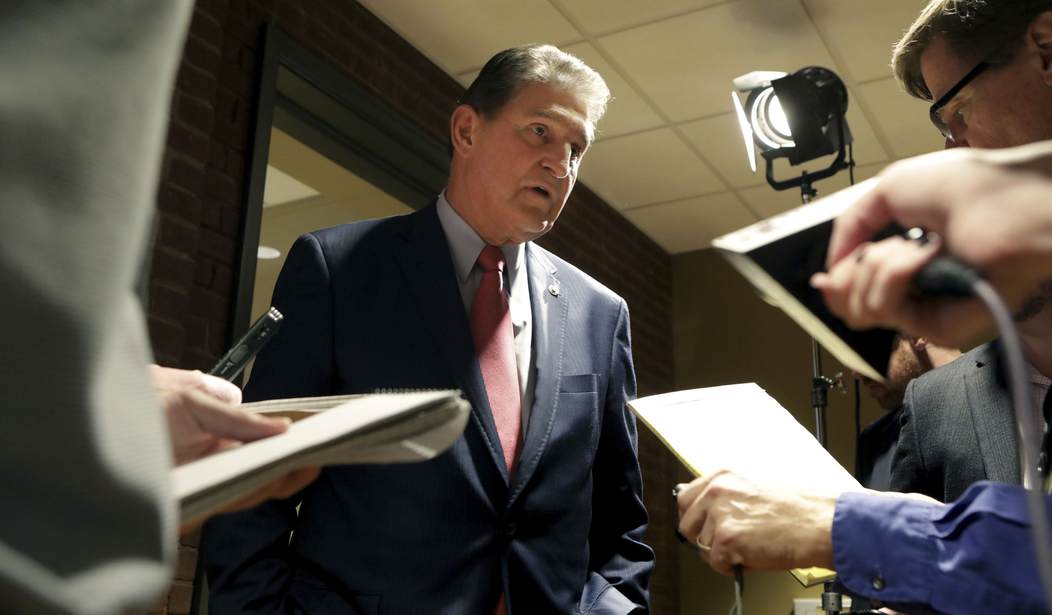There was no real suspense over whether this proposal would die an ugly death in the Senate despite having recently passed the House. D.C. statehood is a non-budgetary matter and thus subject to the filibuster in the Senate, and no Republicans were about to chip in on the push for 60 votes. But for lefties, a faint hope springs eternal that Joe Manchin will see the error of his ways belatedly, decide that it’s time to nuke the filibuster after all, and then join with his party to ram through statehood for Washington, delivering two new Senate votes for his party.
That hope died earlier today when Manchin made clear that he won’t support the House bill.
Although, really, it should have died last fall when Dems realized that their best-case scenario for this year was a 50/50 Senate. Why the hell would Joe Manchin (or Kyrsten Sinema) agree to admit two more Democratic Senate votes knowing that that would dilute their own power over the chamber’s agenda? Right now Manchin is the deciding vote. Biden and Schumer have to take dictation from him in order to get anything passed. Add two lockstep liberal senators from D.C. and suddenly no one will have a reason to take Manchin’s calls.
Go figure that he’s a no:
Manchin cited findings from the Justice Department under Presidents Ronald Reagan and Jimmy Carter and comments from then-Attorney General Robert F. Kennedy in reaching his decision.
“They all came to the same conclusion: If Congress wants to make D.C. a state, it should propose a constitutional amendment. It should propose a constitutional amendment and let the people of America vote,” Manchin said in a radio interview with Hoppy Kercheval of West Virginia’s MetroNews, the full audio of which was provided to The Washington Post by Manchin’s staff…
He said in the radio interview that he viewed the 23rd Amendment as a chief obstacle for D.C. statehood, echoing arguments from congressional Republicans who have called D.C. statehood unconstitutional. The 23rd Amendment, ratified in 1961, gave D.C. three electoral votes in presidential elections.
“It complicates D.C.’s path to statehood because Congress had three options to choose from,” Manchin said. “They could have chose statehood back then, retrocession to Maryland . . . or we can grant electoral votes.
“They chose to grant three electoral votes, which is the same as any small state. That’s where it should be,” he continued. To those who want to change the District’s status, he said, “Let the people of America vote.”
The 23rd Amendment says that in presidential elections D.C. shall appoint “[a] number of electors of President and Vice President equal to the whole number of Senators and Representatives in Congress to which the District would be entitled if it were a State, but in no event more than the least populous State; they shall be in addition to those appointed by the States, but they shall be considered, for the purposes of the election of President and Vice President, to be electors appointed by a State…” The language clearly describes the District as something other than a state.
That’s not the only part of the Constitution that complicates D.C.’s statehood drive. Article I, Section VIII, Clause XVII grants Congress the power to “exercise exclusive Legislation in all Cases whatsoever, over such District (not exceeding ten Miles square) as may, by Cession of particular States, and the Acceptance of Congress, become the Seat of Government of the United States…” Simple legislation to make D.C. a state would need to reckon with that somehow. At best, to be constitutional, the legislation would have to delegate Congress’s constitutional power to make laws for the District to some sort of new state legislature a la the D.C. City Council. But the state legislature would never be supreme. Its lawmaking power would always be at the discretion of Congress unless and until the Constitution was amended. A Republican-controlled government could take it away or carve out exceptions to it at any time.
One way around all of that short of a constitutional amendment is to simply shrink D.C.’s official boundaries to only the acreage needed to encompass the Capitol, the White House, and the Supreme Court. The surrounding area that we currently know as Washington would then be granted statehood as the “State of Columbia” or whatever. That would solve the Article I problem — Congress would still be in charge of making laws for the District, which would now encompass only a few buildings — but it wouldn’t solve the 23rd Amendment problem. The three electoral votes currently granted to the District would need to shift from the new micro-sized District to the “State of Columbia” and that could only be done by constitutional amendment. What’s more, the very idea of shrinking the District as an end-around the Constitution seems absurd, as Ed pointed out a few months ago:
Declaring a new state out of part of a city is so ludicrous that it’s impossible to believe that anyone would take it seriously. What is to prevent Texas from splitting Austin off from Dallas, and Houston off from all of them, in order to get two senators and a representative for each? Every state would start fragmenting to gain advantage in that scenario.
The “State of Columbia” would essentially be a donut on the map (and a far smaller one than the current smallest state, Rhode Island). It’d be sandwiched between Virginia and Maryland with the new micro-sized District sitting right in the middle of it as a sort of donut hole. It’s ridiculous. Manchin’s right — if you want to try to convert the District’s unique constitutional status into statehood as a matter of raw power politics, to add Democratic Senate seats, do it cleanly via an amendment. Anything short of that will lead other populous cities to start pushing for statehood too.








Join the conversation as a VIP Member